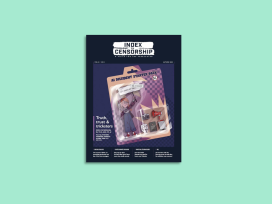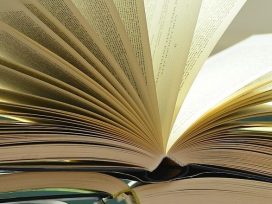Lets consider the alleged “death of the book” a little more closely. When we talk about the death of the book, are we talking about the death of a particular object, a particular publishing format or a platform? Is the era of the printed book, with its progressive page-by-page presentation, over? Will it be replaced by some other format such as the audio book, the e-book or a file distributed over the Internet?
Technically, this is already a reality: more and more e-books are sold every year, old and out-of-print titles are converted into e-books. This does not, however, make the book obsolete. Though the qualities typical of the object disappear – you may not own the book at all but merely buy a license to read it; you don¹t keep a book visibly on the shelf; you no longer make a decision to read this or that book by leafing through titles in bookshops or libraries – it is only the platform and form of distribution that change.
What if the so-called death of the book refers only to the passing of a particular format or type of presentation? Does anyone still read a long, linear text line by line? Perhaps whole books – containing stories or expert information – are simply no longer relevant to the reader? As part of their courses students read articles from Internet journals and access movies and music for entertainment. Rather than talking of the death of the book, is it not rather a question of a change in reading habits? Texts, knowledge, stories and other forms of literary content are still alive and well. Literature still thrives, as does reading: people enjoy stories and search for written knowledge.
The idea of the “death of the book” may refer to the changing role of the author. A work may no longer be created by a solitary author toiling away in his or her chamber, but constructed in collaboration with others, as demonstrated by Wikipedia and other similar encyclopedic formats. Nevertheless, professional presenters of knowledge are still needed, and not every piece of text is considered literature, not every writer as an author. Yet writing is a specialized skill that requires practice and experience. There is a continuing demand for professional writers, even though the nature of their work may change and the author may become an information society specialist working in the web of many-faceted and multifunctional texts.
Although their production and other circumstances have changed in many respects, books, literature, reading and writing are still of crucial importance. Literature existed before the invention of the printing press and will not be eliminated by changes of platform or technology. Once humanity entered the world of written communication there was no way back. The enhancement of common knowledge requires messages independent of time and location. Written language and literature cumulate the ideas and develop them further. The death of this channel is unimaginable.
Bytes mix up the literary world
Digitization has transformed both the work of the writer and the distribution of the book. Technological changes have called into question the principle of copyright: digital content is expected to be free for all, without compensation or remuneration. In the world of printed books and printed information, few would expect to obtain a work for free. In the information society, however, access to information, the arts and culture is sometimes referred to as the citizen¹s fundamental right, the right to get this information for free. It would seem that a new technological imperative has emerged: if it is possible to copy files for one¹s personal use and to distribute them, it must also be permissible and legal – and without charge.
Even though digitization does transform the world there are still various reasons for the maintenance of copyright:
Authors have a right to a financial compensation for their work. This right must be safeguarded regardless of the format of the work, digital or printed. Flexible business models are needed to facilitate the parallel existence of different publishing practices for different fields of the arts and sciences.
Literature is necessary for our understanding and interpretation of an ever more complex world. Civilization needs authors, those who describe and document reality and those who present alternatives and critical interpretations, as well as those who offer us an escape from reality.
The access of readers to culture and information must be safeguarded in such a way that everyone is able to obtain works for their personal use legally and without undue effort. Access to culture is the prerequisite of democracy.
The author has a right to compensation
Authors have a right to their work and they must be able to hand over this right to others in ways they themselves determine. Authors¹ organizations recommend that each right – the right to publish a printed work, to publish an e-book, to translate or modify it etc. – is negotiated separately. Regrettably, digital rights are often transferred to a publisher almost as a by-product of the printed book, even when the publisher has no intention of using them. This kind of automatic transfer is an impediment to the author¹s use of the work.
Those who question copyright often point to the fact that royalties rarely provide a sufficient livelihood. Even within the major languages, few writers earn a living from the sales of their books. Within minority languages the situation is yet more acute.
While copyright comes into existence at the moment a work emerges, sales figures become available only after a considerable period of time. It is clear that copyright cannot be based on sales; on the contrary, copyright safeguards the author’s right to negotiate the terms of transfer of the work, either with the publisher or directly with readers.
The publishing world is becoming increasingly centralized. This has a powerful impact on the royalties and the negotiating position of authors. Publishers are heading for an oligopoly in which a handful of large publishing houses dominate the global market. Economies of scale strengthen their position in securing authors, editing the works, printing and marketing. Large publishers often own major distribution channels such as bookshops and kiosk chains and are able to publicize their books and authors through their own newspaper and magazine businesses.
Alongside the large publishing houses, there are small publishers whose work is based either on a burning ideology or passionate devotion to the business. Their success relies on precision publishing and the hard work of their proprietors. In this sharply divided publishing landscape, authors find it difficult to negotiate terms or evaluate alternatives. The only asset available to authors is their right to their work and to the sale of this right.
Literature is more than a commodity
Literature is a prerequisite of society and culture, and it must not be left to the mercy of the market. The role of non-fiction illustrates the cultural significance of literature. Works that deal with education, professional qualification, self-improvement and self-help are necessary, even though they do not always sell in great numbers. Different specialist professions need their specialized knowledge; different language groups need works that maintain their culture, even when there are a limited number of speakers of that language. The maintenance of the diversity of the world demands that we preserve a diverse use of different languages. Books, literature, knowledge and the arts also require a cultural policy which addresses the issues of the livelihood and social security of authors.
The reader must have access to literature and it is in everyone¹s interest that the use of literary works is promoted in all possible ways. The distribution of digital or digitized books provides various new possibilities for this, but it should be arranged with respect for authors¹ rights. In order to provide readers with extensive access to works, we need clear and easy-to-use practices for safeguarding their legal use. This requires a comprehensive system in which licenses giving clear title to the holders of the rights to works are made available and the user can trust that the content is legal.
The publishing world is undergoing major changes. Authors no longer need a publisher for their work but can publish directly online or in conventional format. There may be a need for new marketing channels or other methods of distribution. Printed works may also be re-published in digital form.
The management of authors¹ rights needs legislation. In the Nordic countries, the extended collective licensing system currently seems to be the best way forward. To make licensing effective, we need registers and search systems to identify authors as efficiently as possible. “Orphan” works are no exception; they need to be protected and licensed in the same way as any other works. Since readers need easy access to works it is crucial that the legal use of works is effortless and that the rules are transparent.
Whatever the eventual solutions in digitizing, distribution and use of works, all stakeholders must be aware of the possibilities and the risks. Copyright issues must be addressed with due care before any investments are made.
Open Access – a special case
Many research institutions and providers of research funding are committed to the principle of Open Access to information; the results of research financed from public funds must be freely available to everyone. This is the only case in which the Open Access principle applies, and there is no reason to extend it to other types of work or other modes of knowledge production. Two kinds of regulations have been proposed for Open Access:
The piece is published in a web publication that is available to the reader without charge. If the piece is published in a commercial publication it should be stored on the web (on the web page of the author, an institution or other agent) so that it is available to all readers without charge. Other texts, presentations, speeches, plans, reviews etc. produced in research institutions may also be stored in such web archives.
It should be noted that even though Open Access texts are free of charge to the reader they are also covered by copyright. Other explicit references and conventions that respect the rights of the author should also be observed. The fact that they are free of charge does not render them free of copyright. The identification of such materials requires explicit practices so that authors can be identified and referred to, even when it is not a question of commercial use.
The time limits of copyright protection are the subject of constant discussion. The prevailing 70-year period has been questioned for several reasons. Radically shorter protection periods or no protection at all have been proposed as alternatives. Major international publishers have campaigned for even longer periods.
From the point of view of the author, it is imperative that the protection period of a work begins from the death of the author, not from the publication of the work. The popularity of a particular work can be quite unpredictable, for instance, a juvenile work by a poet may become popular when the author publishes his or her memoirs decades later. Changes in fashion or philosophical trends may also revive an old work and make it a hit. It seems unreasonable that the author should have to look on without any right to royalties as others market his or her work, which is what would happen if the protection period were shortened.
What do we mean by the “digital use” of works?
Libraries are digitizing works and distributing them to readers. The term used is ³mass digitization”. This is done in almost all European countries. The meaning of this practice is not clear and there is more than one concept of a digital library.
Should digitization be restricted to works without copyright? Or if works still in copyright are dealt with, should there be different practices for those that are out of print and those still in print? There are a number of methods for distributing works in digital form. The reader may only obtain a right to read the work; in other systems it may be possible to copy the work to the reader¹s computer and sometimes also to print it out. It is clear that end users benefit from the distribution of digital works: in schools and universities students can read the works without delay: books are available online and readers are liberated from restrictions of time and space.
There are already various needs for online access to works. In the future, there will be new ways of producing and consuming online literature in all fields of human endeavour – education, professional and expert duties, entertainment, creation of new works, etc. There will be both commercial and non-commercial ways of using works. Books can be stored in databases for viewing and search, or they can be delivered to readers by means of different technologies.
In recent debates, several alternatives for copyright systems have been proposed: cultural flat-rates paid by all citizens in order to obtain access to digital content; broad-band taxes; donations paid by fans to artists or authors; and maybe others too. Such proposals do not seem realistic. Much as it has been criticized, copyright is still the best system. If a more appropriate proposal is forthcoming, it should be discussed by all stakeholders, among whom authors and creators have a crucial role to play.






